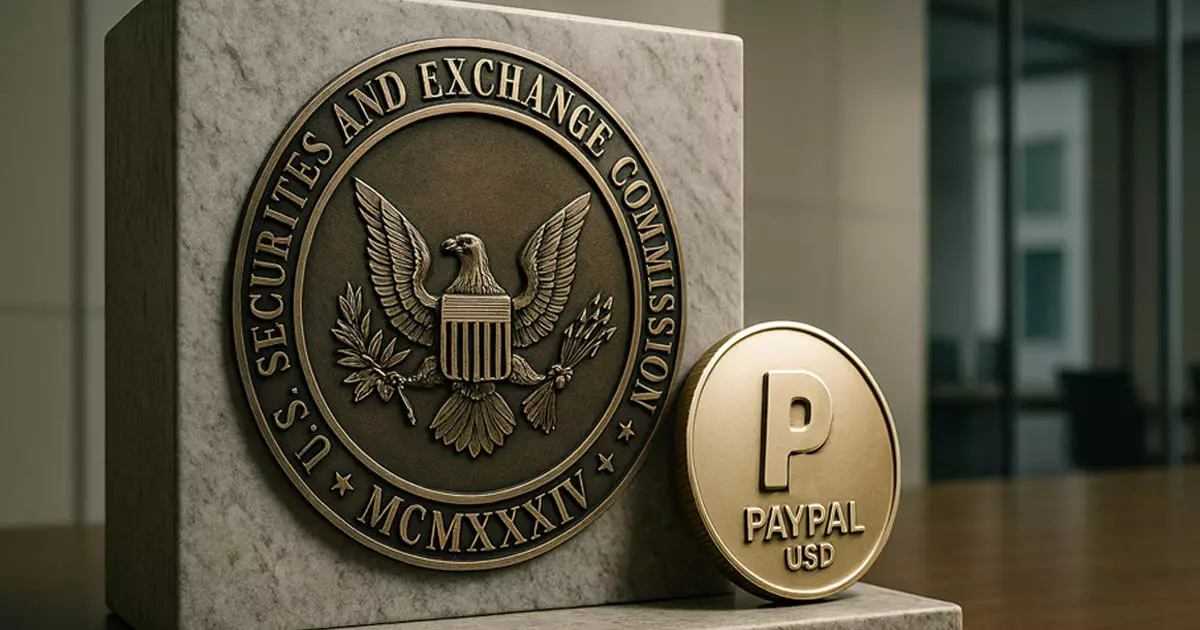The recent decision by the U.S. Securities and Exchange Commission (SEC) to conclude its inquiry into PayPal’s stablecoin, PYUSD, without pursuing enforcement represents a striking shift in the regulatory landscape for cryptocurrency assets. This pivotal move, disclosed in the company’s 10-Q filing for the first quarter of 2025, illustrates a growing propensity to adopt a more permissive attitude toward certain digital assets. It marks an important moment for the cryptocurrency industry, especially for stablecoins, which have long been shrouded in uncertainty and ambiguity.
The inquiry was previously ignited by a November 2023 subpoena that raised concerns about whether PYUSD could be classified as an unregistered security. The SEC’s decision to step back, particularly following the departure of former chair Gary Gensler—who often deemed many crypto assets as securities—can be understood as a response to the overwhelming need for clarity among investors and market participants. The SEC’s decision to refrain from serious enforcement action not only alleviates potential legal pressures for PayPal and Paxos, the issuer of PYUSD, but it also reflects a new direction that is less focused on punitive measures and more on guiding the framework within which these financial innovations can operate.
Legislative Momentum: The GENIUS Act
This newfound regulatory stance could bolster support for the GENIUS Act (S. 919), a bipartisan initiative advocating for a dedicated regulatory framework for payment stablecoins. Such legislation is critically needed to address the unique characteristics of stablecoins that differ from typical cryptocurrencies. The GENIUS Act proposes essential guidelines, including a 1:1 reserve backing requirement and monthly reporting obligations, which contribute to transparency and accountability in an otherwise opaque market.
What stands out is the potential impact of legal safeguards for issuers who are compliant with these frameworks. By providing a clear path for stablecoin issuance, the GENIUS Act may not only promote confidence in the burgeoning digital currency space but also allows U.S.-based firms like PayPal to potentially seize a market advantage over international competitors. However, the effectiveness of such legislative action will depend heavily on bipartisan support and the political will to embrace innovation within the financial sector.
Market Opportunities for PayPal and Paxos
With the SEC stepping out of the way, PayPal now finds itself in an advantageous position to expand its stablecoin ambitions. By integrating PYUSD into its platforms—including Venmo and enabling transfers for ERC-20 tokens—PayPal is positioning itself not merely as a payment processor but as an innovator in the financial technology space. This strategic move allows PayPal to serve over 20 million small businesses, creating a unique ecosystem around PYUSD that could redefine payment rails, effectively bypassing traditional card networks.
As the circulating supply of PYUSD reached approximately $879 million—a small fraction of the $241 billion global stablecoin market—the real opportunity lies in its integration with everyday financial transactions. While its market presence might appear modest when compared to other stablecoins like USDT and USDC, it’s crucial for PayPal to frame PYUSD as a key component of its broader payment solutions strategy. The company’s vision could transform how digital transactions are approached and made mainstream.
Legal and Custodial Challenges Ahead
Yet, despite the optimistic outlook prompted by this regulatory clarity, challenges remain. PayPal has emphasized the custodial and legal uncertainties related to digital asset storage. The warning about the potential for users’ funds to be treated as part of a custodian’s estate in the event of bankruptcy is a significant red flag. This aspect of custodianship requires that organizations involved in the issuance and management of stablecoins begin adopting rigorous risk management frameworks.
Furthermore, PayPal’s operations still face scrutiny from other regulatory bodies, such as the Consumer Financial Protection Bureau and Germany’s Federal Cartel Office, indicating that the road ahead may be lengthy and fraught with complexity. Regulatory interfaces will be paramount in determining how PayPal navigates these added layers of accountability, particularly as jurisdictions worldwide begin to adopt their own approaches to regulating digital currencies.
The SEC’s retreat surrounding PYUSD signals a critical juncture not just for PayPal and Paxos, but for the entire cryptocurrency landscape. It suggests a potential paradigm shift toward a more conducive regulatory environment, paving the way for stablecoins to play an increasingly important role in financial transactions on a global scale. As the stakes rise, the need for prudent regulation and safeguarding consumer interests become more imperative than ever.

